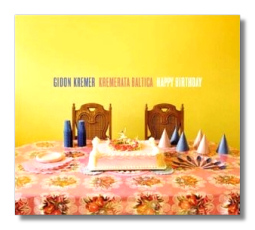
The Internet's Premier Classical Music Source
Related Links
- Latest Reviews
- More Reviews
-
By Composer
-
Collections
DVD & Blu-ray
Books
Concert Reviews
Articles/Interviews
Software
Audio
Search Amazon
Recommended Links
Site News
 CD Review
CD Review
Happy Birthday

- Alfred Schnittke: Polka
- Peter Heidrich: "Happy Birthday" Variations
- Vato Kakhidze: "Blitz" Fantasy
- Joseph Ghys/Adrien François Servais: Variations brillantes et concertantes sur l'air "God Save the King"
- Piotr Ilyitch Tchaikovsky: Elegy
- Edward Bor: McMozart's eine kleine bricht Moonlicht nicht Musik
- Franz Waxman: "Auld Lang Syne" Variations
- Ladislav Kupkovic: Souvenir
Gidon Kremer, violin
Kremerata Baltica
Nonesuch 79657-2 DDD 66:47
This playful CD flirts with depth but, in the end, skips away in favor of cleverness and games. It seems that not even Gidon Kremer knew quite what to make of it all. It works best as a game of associations, "six degrees of separation" interpreted musically.
Peter Heidrich (b. 1935) has written variations on Happy Birthday in the style of Haydn, Mozart, Beethoven, Brahms, Schumann, and Dvořák. He caps them with the theme rewritten as a polka/waltz, a tango, a czardas, in ragtime, and "in the style of film music." It's all very P.D.Q. Bach and amusing enough for its eleven-minute duration. Speaking of film music, film composer Franz Waxman wrote his variations on Auld Lang Syne in the style of Mozart ("Eine kleine Nichtmusik"), Beethoven ("Moonlight Concerto"), Bach ("Chaconne à son gout") and "Shostakofiev." This is a more clever set than Heidrich's because Waxman is more adventurous with his tune; he gives the listener credit for being able to follow more than just simple variations. And, speaking of both Mozart's Eine kleine Nachtmusik and Auld Lang Syne, the two are interwoven with other traditional Scottish (not Irish, in spite of the booklet note!) tunes in "Teddy" Bor's McMozart's eine kleine bricht Moonlicht nicht Musik. (Let's make that "MacMozart," shall we?) Bor's pastiche, if one can call it that, is crude – below the level of a P.D.Q. Bach prank. Fortunately, it lasts for little more than three minutes. The last of the variations is a mid-nineteenth century take on God Save the King, written for violin and cello by Joseph Ghys and François Servais. This is music for virtuoso display, very typical of its time. It's far more Thalberg than Chopin, if you get my drift.
The "Blitz" Fantasy by Vato Kakhidze was written at lightning speed – hence its name. It's a weird work. It opens with the composer's vocalise, performed in the style of a muezzin in his minaret. The vocalise extends through all four sections, to be taken up by the entire Kremerata Baltica (with crunching organ chords!) in the finale. More sensational than sensible, I vote to rename it the "Kitsch Fantasy." Alfred Schnittke's Polka is another spur of the moment composition, and a bitter one too. Ladislav Kupovic's Souvenir has been part of Kremer's repertoire for some time. I've never quite figured out what it is trying to say, but it seems to be a parody. God bless him, Tchaikovsky has written the only completely irony-free work on this CD. What it's doing with this motley crew is beyond me.
Kremer and associates go through their paces with precision and straight faces, the right way to perform such mockery. We remember what a stunning virtuoso Kremer is in the Ghys/Servais. In the Waxman, he is joined by pianist Louis Lortie, violist Ula Ulijona, and cellist Marta Sudraba; Sudraba also is his partner in the Ghys/Servais.
I have no reason to suspect you will not enjoy yourself at this birthday party, but ask yourself if you really need that second piece of cake.
Copyright © 2003, Raymond Tuttle



















